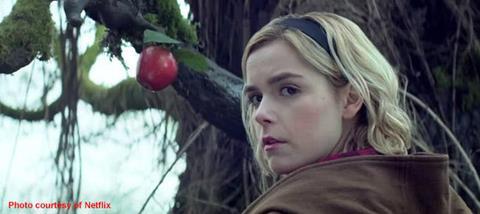
I’m also not squeamish about horror films, gore or spooky stuff. In fact I quite like settling down on a Friday night to a jumpy film with a takeaway. I don’t even mind the odd occult reference. As long as I’m not carrying them out myself, I don’t think the bad things on the telly are going to get me.
But Netflix’s new series, The Chilling Adventures of Sabrina was a little too much even for me to stomach. Possibly because it just gets a little too close to the bone.
What is the Netflix series?
The Chilling Adventures of Sabrina is a Netflix series based on the 1960s Archie comic books. The original Sabrina has been portrayed numerous times since she first appeared in comic form, including the 1990s live action sitcom known and loved by millennials like myself.
However, unlike the 1990s animatronic cat Salem, canned laughter and glitter from fingers that I grew up on, Sabrina has got significantly darker.
Netflix’s adaptation opens with a run up to Sabrina’s 16th birthday where she will have her ‘dark baptism’. According to a conversation between her and Father Faustus in the second episode, the ‘most sacred unholy sacrament’ will involve her signing her name in the Book of the Beast, the most ancient tomb in existence. Sabrina is wary of the rite of passage that allows her to study witchcraft and asks questions that draw out details about the occult as understood in the series.

The Chilling Adventures of Sabrina portrays the occult with uncanny detail to a level even I found disturbing. Spells are shown as summoning spirits to do one’s bidding and parallels are run with Christianity, such as the ‘thirteen commandments’, and her aunts crying ‘praise satan’ as their go-to phrase.
The devil as the embodiment of evil is laughed off, corrected as the embodiment of free will. Father Faustus explains: “Good, evil, those words matter to the false God, but the Dark Lord is beyond such precepts…If you accept the Dark Lord’s gifts, you wont die for a very long time. Second of all, hell is for mortals. In exchange for their service and devotion witches are exempt from the eternal flames of damnation”.
I’m sure I don’t need to explain why that’s problematic at best. Apart from complete false theology, it presents the devil as a plausible choice. It hints that if you do enough evil then you, like the devil, will be above the creator God, one who has a ‘get out of jail free’ card for those who wish to follow him. Also Sabrina as a plucky hero makes it look like a choice that could actually be moral.
Why would teenagers watch it?
Apart from because it’s so well advertised, their friends will be and they’ll want to know what the fuss is about. Plus it’s well made, with depth of plot and intrigue.
It actually deals well with the issues many teenagers face. Sabrina’s relationship with her boyfriend Harvey is actually quite a healthy one. She wants to stay with him despite knowing she will have to move to ‘witch school’. It therefore covers tension over more everyday rites of passage like moving school and growing up.
Sabrina and her friends are deeply political, discussing issues many teenagers, particularly teen girls feel passionate about. For instance, one of her classmates is sexually assaulted and when she confronts the issue, she is not listened to. In a time of #MeToo, Netflix is right on the button with how many girls are feeling.
And even if we narrow it down to our church kids, the conversations Sabrina has with her aunts over her imminent dark baptism probably reflect a few questions they might have over their own faith. Sabrina is given space to ask why she should follow what she sees as her aunts’ beliefs. She doesn’t want to reject them and fears that questioning them will appear that way. But she has reservations about giving up things in her so-called ‘mortal’ life for the sake of the occult. I imagine this portrayal would reflect how many Christian kids feel.
What should we do?
I’m never one for banning kids from watching things. Mainly because I think young people will only want to watch it more and will be drawn to do it behind our backs.
Plus, I think young people need to learn to navigate how to handle things that don’t match their worldview. And the only way we can help them with that is by coming alongside them as they work out what that means.
We need to lay the groundwork. If we’re not talking about the possibility that there is spiritual warfare but God always comes out on top then they are going to pick up someone else’s understanding. And if they get it from Netflix it’s going to be hard to untangle biblical truth from Sabrina’s beliefs. We need to be talking about the possibility that to understand Jesus as the light, then there’s going to be some darkness.
We also need to learn from what Netflix has achieved. Their series scratches a few itches teenagers have, dealing with the genuine issues they’re facing. It doesn’t undermine their intelligence by dumbing things down to simple black and white understandings of the world but portrays a depth to good and evil. We should be doing the same. But better.
Finally we shouldn’t be panicking. As with any of these things, if we lay the groundwork and trust that the Holy Spirit is in charge, our young people will be fine. We just need to be open and honest to questions the series might raise, praying with our teenagers for understanding. Who knows, maybe this could be the perfect opportunity for sharing a better, truer and deeper understanding of the world. Both for our kids and their friends.






































